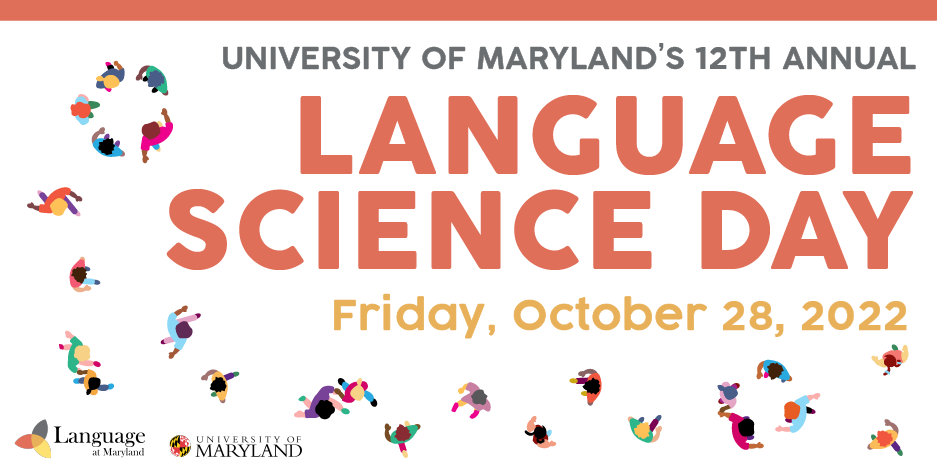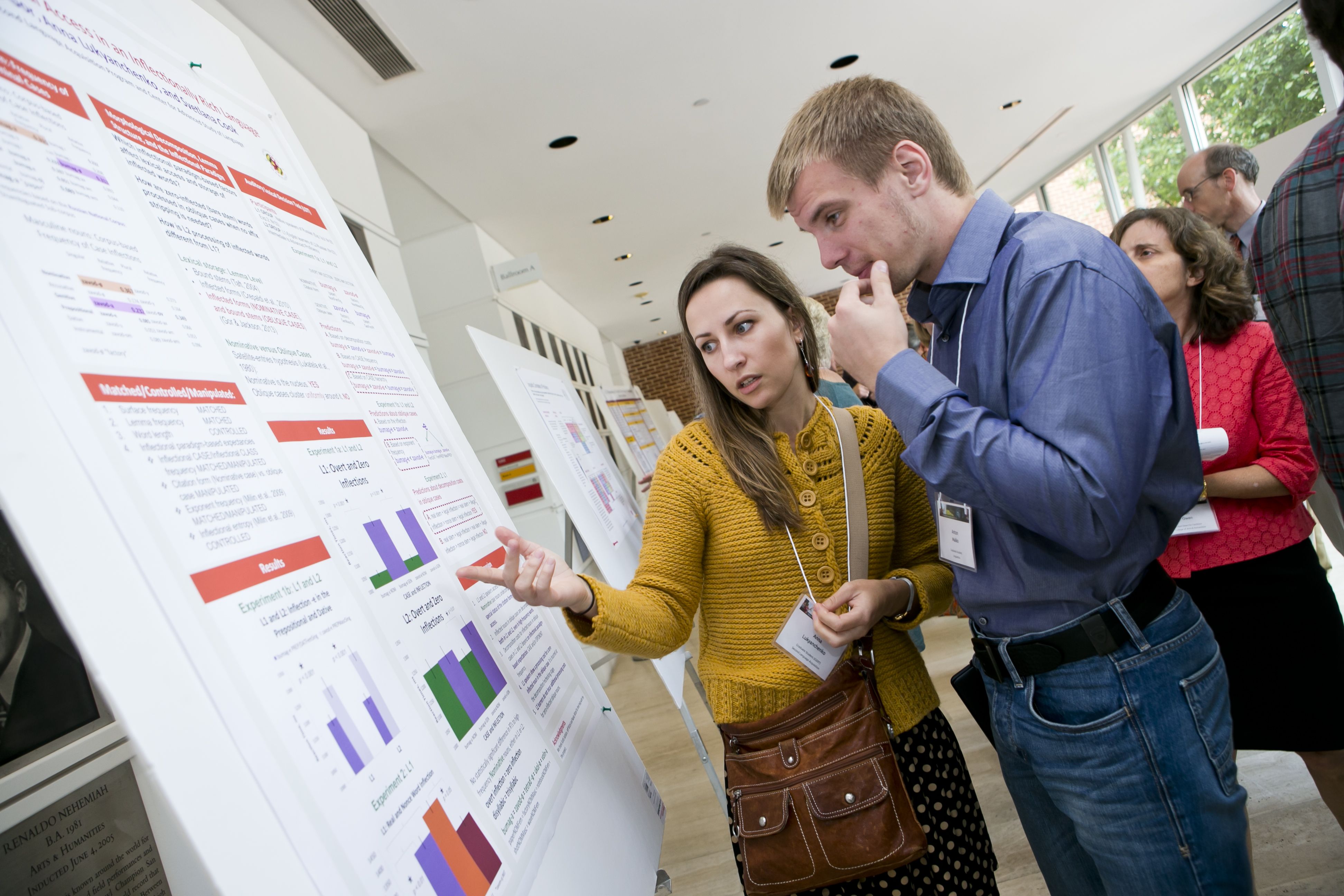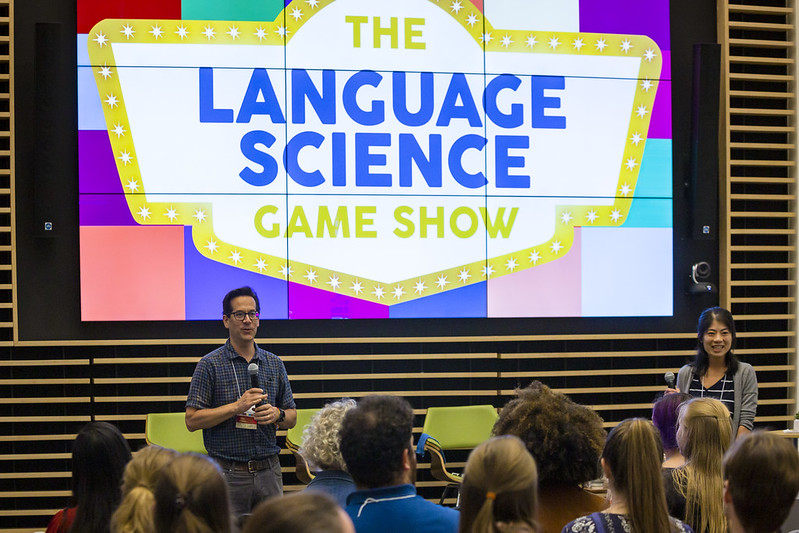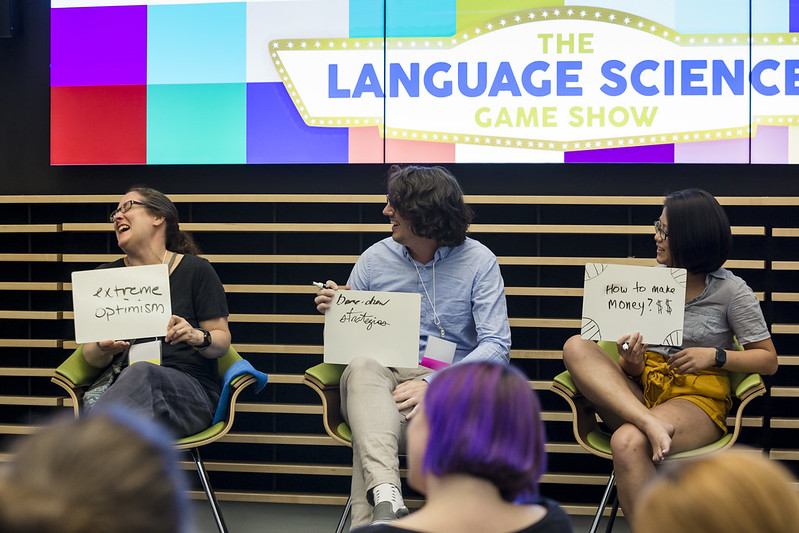Language Science Day 2022 + Literacy & Equity Forum

The 12th annual Language Science Day is scheduled for Friday, October 28, 2022.
Language Science Day (LSD) is a signature annual event for Maryland's language science community, bringing together up to 200 students and faculty from across the university and affiliated centers. Participants get to know their fellow language scientists, exchange ideas, showcase their research, and discover opportunities for training or collaboration.
Schedule
All rooms are in H.J. Patterson Hall. The only wheelchair-accessible entrance to the building is on the parking lot side, the door furthest to the west (i.e. closest to the Health Center).
| Time | Event | Location |
|---|---|---|
| 9:00 - 12:00 pm | Literacy and Equity Forum | Room 2114/2118 |
| 12:00 - 1:00 pm | Registration and Lunch | Language Science Center (Room 2130) |
| 1:15 - 2:00 pm | Breakout sessions | Rooms 2114, 2118, 2123 |
| 2:10 - 4:00 pm | Poster sessions | Language Science Center (Room 2130) |
| 4:15 - 5:00 pm | The Language Science Game Show | Global Crossroads Atrium (1st floor) |
All are welcome to join for the whole day. Literacy experts who attend the Literacy and Equity Forum are encouraged to stay for lunch and for afternoon activities at Language Science Day, including sharing their work at the poster session. Other language scientists are very welcome to participate in the morning literacy discussions.
Literacy & Equity Forum
The morning (9am - noon) will be devoted to a new university-wide initiative which is among the finalists for UMD’s Institutional Grand Challenges grants. The Maryland Initiative in Literacy and Equity (MILE) will serve the UMD and surrounding community as a cutting-edge basic and translational research, professional practice, policy, and community outreach collaborative on literacy. Broadly defined, literacy involves many different skills, including reading, writing, speaking, and listening, and it has importance across the lifespan, from early childhood through school ages and adulthood. Expertise at UMD spreads across at least five colleges. With the support of teachers, librarians, speech pathologists, policymakers, families, and diverse community members, the Literacy and Equity Forum seeks to bring together faculty and students from across campus to inspire new ideas, collaborations, and opportunities for the future of MILE.
Featured presenters and panelists:
Brit Kirwan, former UMD president and chair of the Kirwan Commission
Eric Luedtke, Maryland House Majority Leader, Clinical Associate Professor in the UMD School of Public Policy
Megan-Brette Hamilton, Chief Staff Officer for Multicultural Affairs at ASHA
UMD faculty: DJ Bolger (HDQM), Rachel Romeo (HDQM), José Ortiz (HESP), Eliza Thompson (HESP), Rebecca Damari (NFLC), Brandi Slaughter (PLCY), Susan De La Paz (CHSE), Jade Wexler (CHSE), Drew Fagan (TLPL), Jennifer Turner (TLPL), Mega Subramaniam (iSchool)
Morgan State University faculty: Simone Gibson
Organizers: Rachel Romeo, Ebony Terrell Shockley, Eliza Thompson, Maggie Peterson, DJ Bolger
Breakout sessions
We will have breakout sessions on three themes. The sessions will begin with a series of lightning talks, followed by open Q&A and discussion.
Language in the classroom (HJP 2114)
Moderator: Zach Maher (NACS)
- Rochelle Newman (HESP): Noisy classrooms and student learning
- Kristabel Stark (CHSE): Building Research-Practice Partnerships to Implement School-Wide Literacy Models
- Rasha Alkhateeb (TLPL): Reflections from a Writing Center Fellow: Triangulation & Student Writing Identities
- Janece Nelson (Morgan State University): Lessons from teaching struggling readers as a teacher candidate
- Jon Malone (SLA): Should we mind the shop, the gap, or the baby? Usage-based teaching of multi-word units in the language classroom
- Shenika Hankerson (TLPL): How racialized writing trauma manifests in the U.S. writing classroom: The case of the African American Language (AAL) speaker
- Thurman Bridges (Morgan State University): Supporting critical thinking and reading through artifact sourcing
Remote research beyond the pandemic (HJP 2123)
Moderator: Katherine Howitt (LING)
- Erika Exton (HESP): Getting creative with infant data collection
- Shevaun Lewis (LSC): Building Zoom features to improve communication between autistic and neurotypical people
- Masato Nakamura & Rosa Lee (LING): How to make your online speech production experiment work
- Yongle Zhang, Yimin Xiao (iSchool): Technology Design for Multilingual Teams and Communities
- Veronica Kang (CHSE): Adaptation of early literacy curriculum for Korean immigrant autistic preschoolers
- Kathleen Oppenheimer (HESP): Making synchronous virtual research fun for young children
The next generation of tools for diagnosis and assessment (HJP 2118)
Moderator: Sophie Damanski (HESP)
- Nan Ratner (HESP): Developing a "diagnostic panel" for child language disorder
- Philip Resnik (LING/UMIACS): Language Use and the Assessment of Schizophrenia, Depression, and Suicidality
- Carol Espy-Wilson (ENEE): Speech acoustics and assessing mental health
- Bronson Hui (SLA): Assessing vocabulary in second language acquisition with psycholinguistic tasks
Posters
Session 1 (2:10-2:50)
- Non-lexicalist approaches in psycho- and neuro-linguistics
Alex Krauska, Clara Cuonzo
- The Language Development Lab (Canine Studies)
Annie Harris, Mine Muezzinoglu, Erika Exton, Rochelle Newman, Tate Yuen, Hannah Burchard, Abby Poulton, Megan Baranowsky
- Studying Sentence Production in Aging and Stroke, but using MEG??
Bob Slevc, Yasmeen Faroqi Shah, Christian Brodbeck, Ed Smith, Ciaran Stone, Rebecca Warwick, Jasmin Abercrombie
- Ready for Takeoff?: Introducing the LEAD Lab Using the Preschool Language and Neural Engagement Study (PLANES) Project
Ellie K. Taylor, S. Alexa McDorman, Victoria Alexander, Gavkhar Abdurokhmonova, Ellen C. Roche, Ama Arhin, Alexandra Haralanova, Jun Ikeda, Natalie Sharbin, Rachel R. Romeo
- The Language Science Station at Planet Word
Charlotte Vaughn, Hannah Mechtenberg, Jessica Orozco Contreras, and many others
- Statistical learning in Language and Reading Development
Jinglei Ren, Min Wang
- AIM Coaching: Building Secondary Literacy Through School-Wide Models
Kristabel Stark, Jade Wexler, Alexandra Shelton, Tara Johnston, Robin Sayers, Karen Omohundro
- Are personal and reflexive pronouns dissociated in agrammatic aphasia? A systematic review
Loubna El Ouardi , Yasmeen Faroqi-Shah & Mohamed Yeou
- What happens during errors in speaking and understanding and why do they matter?
London Dixon, Allison Dods, Katherine Howitt, Rosa Lee, Sebastian Mancha, Masato Nakamura, Sathvik Nair, Tal Ness, Colin Phillips, Utku Turk
- How are second-language word forms connected to their meanings?
Ruirui Jia, Zhiyi Wu, Nan Jiang
- Africa through Language and Area Study Initiative (ATLAS)
Miranda Abadir, Matthew Thomann
- Lectia, A new type of language learning app for the real world
Joanne Roby, Connie DiJohnson
- Teacher Beliefs and Knowledge of Black English
Jasmine Rogers, Simone Gibson, Annie Karabell Eugene Pringle, Janique Parrott-Gaffney
- The University of Maryland Writing Project
Maggie Peterson, Beth Singleton
Session 2 (3:20-4:00)
- Multimodality in Second Language Acquisition
Bronson Hui, Jon Malone, Tetiana Tytko, Micheline Wilson
- Verbs' Selectional Preferences Modulate N400 Response in Sentence Processing
Chiebuka Ohams, Shohini Bhattasali, Philip Resnik
- Emotions in Polish & Lithuanian Facebook
C. Anton Rytting, Anna Prince, Ewa M. Golonka, Susannah B. F. Paletz
with Michael A. Johns, Nicholas B. Pandža, Egle E. Murauskaite, and Kelly Jones
- Progression of acoustic, phonemic, lexical and sentential neural features emerge for different speech listening
I.M Dushyanthi Karunathilake, Christian Brodbeck, Shohini Bhattasali, Philip Resnik, Jonathan Z. Simon
- Taking Language Science to Zoom School: Virtual Outreach
Erika Exton, Kathleen Oppenheimer, Craig Thorburn, Lauren Salig, Alex Krauska, London Dixon, Katherine Howitt, Chloë Miller
- Uncovering What Children Know About Their Language
Imane Bou-Saboun, Rin Gourianova, Katherine Howitt, Chloё Miller, Sterling Mullenix, Jack Yuanfan Ying, Jeffrey Lidz
- Language Change and Changing Languages: Influences of short- and long-term experience on online language processing
Bob Slevc, Kelly Marshall, Mia Lulli, Rachel Thompson, Jeymi Menendez, Hanna Shine, Lauren Salig
- The Language Development Lab
Mine Muezzinoglu, Annie Harris, Erika Exton, Rochelle Newman, Ivy Huang, Emily Trujillo, Ruth Park, Sam Bashir, Japneet Singh
- Language Fluency Lab
Nan Ratner, Carly Rosvold, Allison Godsey, Madison Burns and a cast of many others
- Tracking individual entities across a discourse: an ERP study of sustained neural activity
Ellen Lau, Xiaoyu Yang
- How do language(s) we know influence how we learn a new language?
Zhiyi Wu, Mireia Toda Cosi, Kira Gor
- Aptitude for Foreign Language Learning: a Multi-Level Validity Generalization
Mireia Toda Cosi, Steven Ross
- Technology Design for Multilingual Teams and Communities
Yongle Zhang, Yimin Xiao, Ge Gao
- Alpha EEG and inference in narrative comprehension
Jaylen Worthy, Carlos Koudouovou, Ben Rickles, Donald J. Bolger
The Language Science Game Show
Back by popular demand after a 2-year pandemic hiatus, the Language Science Game Show makes its triumphant return with emcees Jeff Lidz and Yi Ting Huang!







